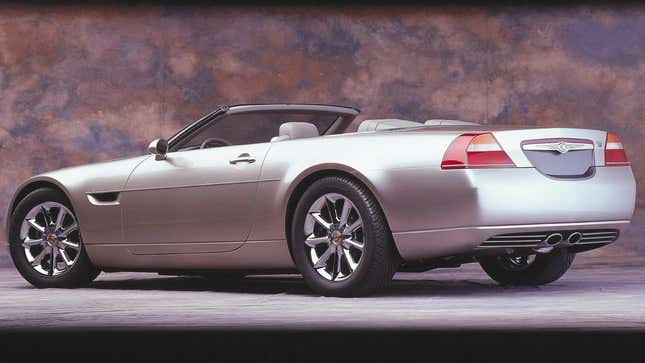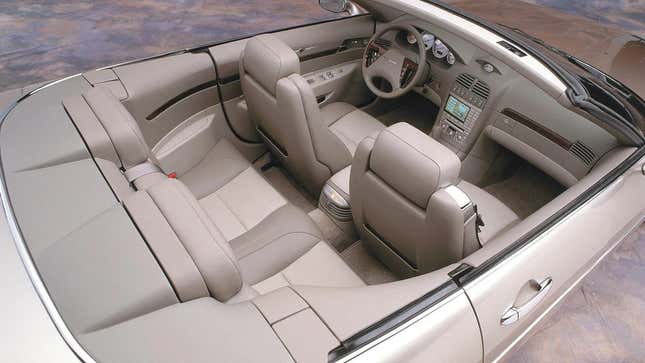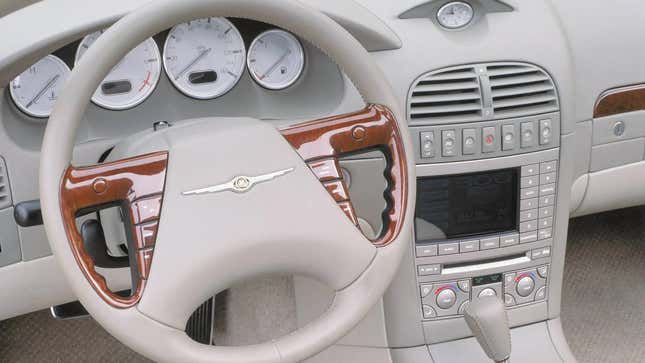The Chrysler 300 Hemi C Concept Was The Chrysler 300 We Deserved

The Chrysler 300 was a name that the brand would revisit time and again in both production and concept car form, but no 300 wore the badge better than the 300 Hemi C Concept.
The Chrysler 300C Ends Production
The Chrysler 300 and its letter series cars had gained legendary status from its run in the 1950s through the late 1960s, during which time it was used on everything from full on muscle cars to personal luxury coupes. During the 33 year period between the last Chrysler 300M in 1966 and the return of the nameplate in 1999, the 300 appeared as two different concept cars and one concept prototype, one of which was a near production ready concept.
1999 Chrysler 300MImage: Chrysler
By the last turn of the century the Chrysler 300M was already making a name for itself as a luxury performance sedan. Chrysler decided to keep the good times rolling:
“The straight-line power of the ‘50s and ‘60s has been replaced by a balance of crisp handling and sophisticated performance, yet the Chrysler 300 Hemi C still reflects the same philosophy and pedigree of those early letter series cars,” Tom Gale, then-Vice President at Chrysler said at the 300 Hemi C’s introduction in 2000. “This vehicle explores a direction we might take if we were to return to an all-American V-8, rear-wheel-drive luxury performance car such as the famed 1957 Chrysler 300 C convertible.”
The result was a concept that rode on the same LH platform as the brands cab-forward sedans at the time. It was a long, front-engined, rear wheel-drive convertible that was designed around an early version of the brand’s 5.7-liter Hemi V8 as Chrysler’s senior design manager at the time Joe Dehner described:
It is as if we stretched the body around the V8 HEMI engine. The concept’s rear-wheel-drive set-up allowed for a minimal front overhang, while the front fender air exhaust ports and the centrally placed chrome twin exhaust pipes signal its performance. And similar to […] the Chrysler Sebring, this concept is a true four-seat convertible.
Up front was the grille that was inspired by the original Chrysler 300 flanked by big round headlights that look almost identical to the ones used on the production 300M topped off by a massive hood with a center peak line. Alongside were chrome bodyside moldings with the exterior getting covered in a paint color called Frosted Mocha Pearlcoat that should have been used across all of Chrysler’s lineup at the time. Big 19-inch wheels helped emphasize the car’s design.

Image: Chrysler
The rear was just as handsome as the rest of the car, with taillights inspired by the 300M with amber turn signals, dual center exit exhaust and an integrated high mounted stop light that sat on top of Chrysler’s winged badge.
Under the hood, though, was the only thing from the concept that ever actually made it to production; the Hemi C was equipped with an early prototype version of Chrysler’s 5.7-liter Hemi V8. It made 353 horsepower and 353 lb-ft of torque and was paired to a four speed automatic transmission.

Image: Chrysler
The interior of the Hemi C really showed production intent though. Chrysler designers brought a fine attention to detail inside, from the California Walnut trim to the tailored seats, even in the one touch power folding top. From the gated shifter to the controls, this could have easily been built and sold well. It also had some impressive tech for the time.

Image: Chrysler
It featured an infotainment system Chrysler called “Infotronic” that included an in-dash GPS navigation system, an LCD display with voice command function for various features like the climate control and audio system, a trunk mounted laptop and even internet access to run it. Even the vehicle’s security was ahead of its time. The concept featured a fingerprint scanner that unlocked the vehicle. If a fingerprint was scanned that wasn’t registered to the vehicle’s system, it wouldn’t start or open.
While the concept eventually faded into obscurity with the almost shocking debut of the Chrysler 300C sedan a few years later, it’s cool to look back on what could have been had Chrysler gone a more luxurious route with the legendary nameplate.




